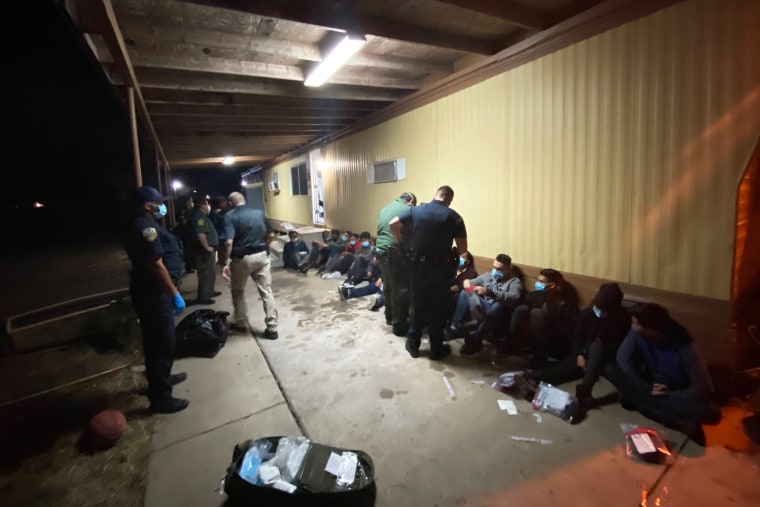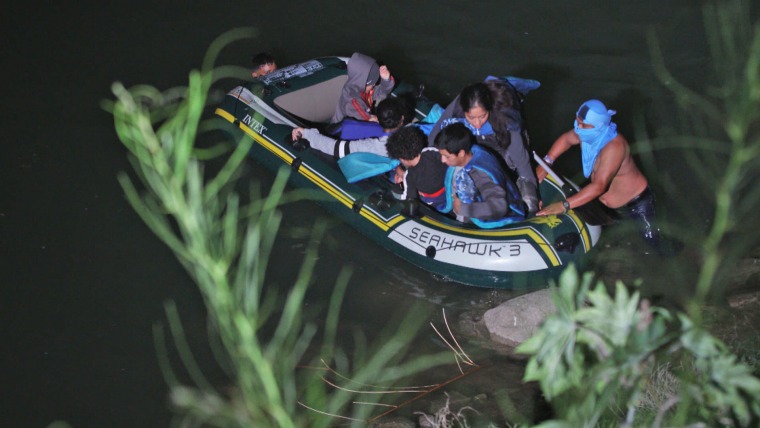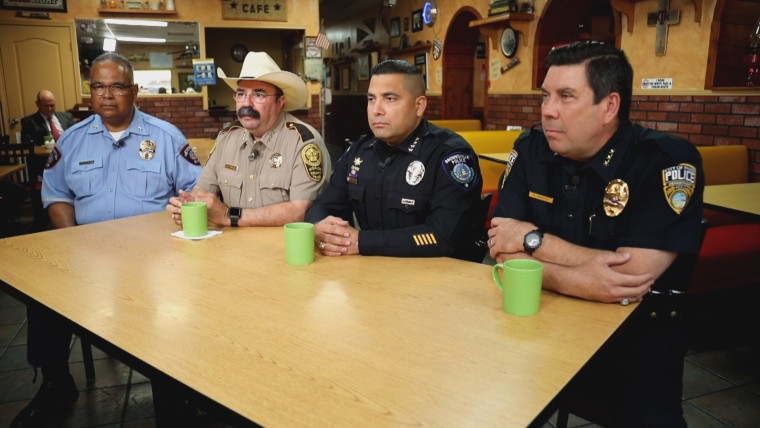PHARR, Texas — Every week, chiefs of police from the Rio Grande Valley meet for breakfast at the Junction Cafe in this border town to eat machacado con huevo and swap stories.
On a recent Wednesday, sitting at his usual table, Pharr Police Chief Andy Harvey described a frantic call he got from a man who'd escaped from a stash house where he'd been held with 70 other undocumented migrants.
Human smugglers, or "coyotes," commonly use stash houses as holding pens as they prepare to sneak migrants deeper into the U.S.
In this case, Harvey recalled, "they were left to fend for themselves to the point where one of them snuck out and called us, 911, the local police, to come help them because they were pretty much left alone."
The house, a yellow converted trailer on a quiet street, would have gone unnoticed if not for the call. The man told Harvey that he escaped because conditions had made him afraid for his life. He said that there was no running water or furniture but that the coyotes had warned all 70 men and women not to leave.
Harvey found the house full of migrants, who were later handed over to federal immigration agents. Harvey also found a spiral notebook containing the names of "caminantes," or migrants who would have to walk, and "especiales" — migrants who paid smugglers more so they could make at least part of their journey north in a vehicle.
Such crimes worry Harvey and his peers.

"One thing we don't want, and I think we could all say the same thing as chiefs, is crimes happening in our community and us not knowing about it," he said.
But if some outsiders think Texas border towns have become "war zones" during the 20-year high in border crossings, the chiefs say that's far from reality. Walking down streets in their towns remains safe, they said.
"They're thinking the sky is falling here," said another of the breakfast crew, Victor Rodriguez, chief of police in neighboring McAllen. "The reality has been that we've been decreasing crime that same period of time, as opposed to increases in crime."
He said 2020 was the 11th straight year crime had dropped in McAllen.
Rodriguez, Harvey and their breakfast partners serve border counties with a total population of more than 1 million. They worry that the perception of a lawless border may be hurting the local economy, because they have had to explain to church groups and business convention planners that it's still safe to come to the Rio Grande Valley.
Drug and human smugglers do cross through their cities. Customs and Border Protection says it has seized at least 1,000 pounds of cocaine and 1,000 pounds of meth on this stretch of the border this year.
But as Harvey said: "They're merely coming through. They're only stopping here for a short time, because they're moving up north."
Rodriguez said the same applies to migrants: "These folks are not coming to live here. They're landing here. They're crossing here."
The real way the migrant surge is affecting them, said Hidalgo County Sheriff Eddie Guerra, another member of the breakfast group, is by draining resources. Federal agents are so busy processing newly apprehended migrants that local police have to do some of their other jobs — like raiding stash houses, busting coyotes or saving border crossers suffering from dehydration and heat exhaustion.
"We take up the slack," Guerra said. "We're doing the rescues out in the rural areas of the county [where] these immigrants find themselves in peril. ... It ties us up. These are things that normally our federal partners would be doing."
Children are changing the game
Because of the spiking volume of border crossers, about 40 percent of federal border agents in the Rio Grande Valley are busy simply processing those who have been caught or who have reported to legal ports of entry, Border Patrol Sector Chief Brian Hastings said.
Hastings also said the record number of children crossing the border is taking a considerable amount of manpower.
During the Biden administration, only children who arrive at the border without their parents are guaranteed entry. And unlike single adults and families, who may be released with court dates, children are held in Border Patrol facilities until they can be transferred to Health and Human Services custody and eventually the homes of relatives or sponsors in the U.S. There they wait for decisions in their asylum cases.
"If you look back to 2014, a year which we saw a record number of children crossing the border, or 2019, we also were around 35,000 for the whole fiscal year. We've already exceeded that number here in the Rio Grande Valley this fiscal year," Hastings said.

For the police chiefs and sheriffs, that means even more time spent on the humanitarian mission at the border rather than on local law enforcement.
"The unaccompanied children, they pose absolutely no security threat for us. What it does is it ties up the hands of my federal partners," Guerra said.
Hastings said the policy "could be" driving more parents to send their children alone rather than going with them.
"I think the scary part for us as Border Patrol agents is the safety of the kids that we're seeing out there. ... We've seen smugglers stoop to the level of kicking kids and people who can't swim out of a raft that's crossing the Rio Grande River, knowing that our agents will go rescue those kids and the smuggler can swim safely back to Mexico."
He said he thinks the U.S. needs an immigration policy that "is able to provide humanitarian relief" while also providing national security. "With what we have currently, we're struggling with that due to the high numbers that we're seeing," he said.
The humanitarian crisis and the danger of the journey for migrants are messages the chiefs and sheriffs repeat to delegations from Congress, where they say comprehensive immigration reform legislation is needed.
Brownsville Police Chief Felix Sauceda, also at the breakfast table that Wednesday, said the chiefs are working to convey to policymakers that what is happening here is the "product of policy" and that they need "resources, ample resources, to continue to do our day-to-day operation in full collaboration with our state and federal partners."
Rodriguez said he wants everyone to know that immigrants crossing the border don't stop at the border, meaning any border crisis is a national one.
"They're going to Houston. They're going to Dallas. They're going to Chicago. They're going to New York," he said. "That's where these folks are going. And that, I think, that's probably the [greatest] misperception of all of this."


